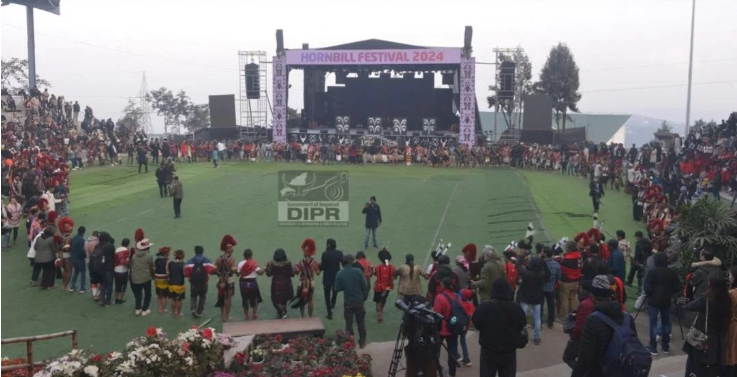
The 25th Hornbill Festival concluded on a high note Tuesday with a grand closing ceremony at the Main Arena in Kisama, marking the successful end of a 10-day celebration of Nagaland’s vibrant cultural heritage.
In his closing address, Nagaland’s Minister of Tourism and Higher Education, Temjen Imna Along, who hosted the event, credited the festival’s success to the visionary leadership of Chief Minister Neiphiu Rio. “The Hornbill Festival goes beyond cultural and tribal boundaries, uniting humanity,” Along said, highlighting the spirit of unity, spirituality, and shared enthusiasm among the people.
Along commended the Department of Art and Culture, led by Adviser K. Konngam Konyak, for showcasing the work of Nagaland’s artisans to a global audience. He also praised the Tourism Department for its meticulous planning and the Task Force for Music and Arts (TaFMA) for fostering creativity in the fields of music and arts.
He acknowledged the excellent coordination of security and logistics, thanking the Nagaland Police and administrative leaders, including Chief Secretary Dr. J. Alam, for their collaborative efforts. The Minister expressed his gratitude to local churches, Nagaland residents, media partners, and international collaborators for their role in the festival’s success.
The closing ceremony featured cultural presentations, musical performances, and a symbolic bonfire lighting by Along, Miss Nagaland 2024 Anon Konyak, and the pageant runners-up, marking the end of the festival.
The Hornbill Festival not only highlighted Nagaland’s cultural unity and artistic talent but also solidified its reputation as a premier international cultural event, attracting visitors from both within India and abroad.
On the final day, various cultural troupes showcased an extraordinary display of Nagaland’s cultural diversity under the theme “Cultural Connect.” According to the DIPR, the morning session, co-hosted by Advisor for Geology & Mining, DUDA, W. Chingang Konyak, featured captivating performances from cultural groups such as the Chakhesang troupe performing Thele Lu (folk song), the Sangtam troupe’s Titse Nyeh Khidong (Millet Harvesting song), and the Angami troupe’s Zakhama Kehou (folk song). Other performances included Watemdong dance by the Ao troupe, Jamhang folk dance by the Khiamniungan troupe, and the Aphilo Kuwo (victory dance) by the Sumi troupe. The Garo troupe performed Dim Dim Chong (Wangala Folk Song), while the Phom troupe presented a commemorative performance.
The afternoon session was attended by Baushuan Ger, Ambassador of the Taipei Economic and Cultural Center in India, actor and producer Zayed Sanjay Khan, and Rohit Gopakumar, Group CEO of the Times Group. The session, hosted by Minister for Rural Development, SIRD, Metsubo Jamir, and Advisor for Transport and Technical Education, Temjenmenba, featured notable performances such as the Tokhu Sharü (folk dance) by the Lotha troupe, Tatin Tinbo (seed sowing) by the Zeliang troupe, and Shangpele festival dance by the Chang troupe. The Rengma troupe demonstrated cotton spinning and basket weaving, while the Kuki troupe performed Suhta Lam (pestle dance), and the Konyak troupe showcased Shamshu Lok (log drum beating).
During the ceremony, awards were presented to honor outstanding performances and contributions. The Best Commemorative Performance award went to the Ao Cultural Troupe (Rs. 20,000). The Best Performing Cultural Troupe awards were given to the Konyak Cultural Troupe (Rs. 15,000) and the Rengma Cultural Troupe (Rs. 10,000). The Best Morungs were awarded to Ao Morung, Chang Morung, and Konyak Morung, while the Best Stalls were awarded to Tepok Oshidak, Nouva, and Ao Fusion. Certificates, photo frames, cakes, and cash prizes were distributed to all participating cultural troupes.

The Hills Journal
K. Salbung, Churachandpur
Manipur-795128